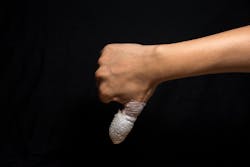Injured or sick? What to consider before going to work
“Slammed my finger in a door Thursday night. It isn’t broken, just badly sprained and in a splint, still don’t have feeling in the fingertip. How am I supposed to fulcrum?”
Every hygienist who read this post cringed. A close-up photo of Michelle’s injury showed serious swelling and clear damage to the soft tissue around the cuticle. The following day her finger was purple, and a blood clot had formed under her fingernail.
The outpouring from colleagues was immediate, and included their own personal finger- and hand-injury stories, tips on how to make it through the clinical day, and well wishes for rapid healing.
The recommendations for getting back to work immediately included splinting the finger, wrapping it in a big, spongy band aid, icing down the finger, and taking an anti-inflammatory medication. Others suggested using an extraoral fulcrum or switching to power scaler for all instrumentation.
Initially Michelle was focused on how she would be able to work clinically. She spent the day after the injury practicing picking up pencils to see if she could even manage grasping an instrument. She was scheduled to work as a temp in a new office and she did not want to leave a bad impression or disappoint a potential new employer. A number of colleagues urged her to take the day off.
Canceling a day of work
Every hygienist who has contemplated cancelling a day of work due to illness or injury faces this type of dilemma. Many feel a lot of pressure to work even though they are in pain. Some offices lay a huge guilt trip on the hygienist. The opposite can also happen. There are hygienists who feel trapped financially. Others are scared to cancel the day, fearing a cascade of repercussions that can include not financial ones, but potential damage to their reputation for reliability.
After decades of working, and rarely cancelling a day, especially at the last minute, it is easy to understand that calling in sick can be hard. Just like any other life issue, there are a number of ways to work through an event like this, and still have a comfortable resolution. Here are five important points to consider if you are facing cancelling a day. These are particularly relevant if you have an accident to your hand and even more important if the injury involves any type of cut to the skin.
- You are injured. Patients are entitled to the best work you can offer. Can you do your best work with this type of injury? Probably not.
- If the skin integrity is compromised, there is no adequate way to protect yourself from getting a serious infection at the site of the wound.
- Gloves do not provide 100% protection. All gloves have some level of microscopic pinholes. Oral pathogens can pass through these microscopic tears on to the user’s skin.
- Keeping your skin covered with gloves actually slows the healing process. Microbes love hot, moist places. Gloves diminish the air supply dramatically. Anaerobic microbes thrive in the low oxygen environment created by gloves.
- Exam gloves are not sterile. Some are cleaner than others, but unless the office has sterile gloves (which is highly unlikely), it is possible to develop an infection from the bioburden inside the gloves.
- If you develop a polymicrobial, biofilm-based infection in your finger or hand, antibiotics will do little to resolve the infection. You will lose additional time from work and rack up more medical bills.
The business way to cancel
No one relishes the inconvenience created by cancelling an assignment, especially if this is the first time at the practice. It’s even more complicated if you booked the event directly without the assistance of an agency. To avoid getting a bad reputation, here are some tips to ensure the doctor and the team understands you are taking their business seriously.
- Contact the office immediately. Explain the situation. If there is an obvious injury, a visible rash, or some other documentation, send the office a photo of the injury and/or a note from your doctor that clearly indicates that you are not well enough to provide optimal clinical services.
- Let the office know that you are concerned about the welfare of their patients and the quality of the care you are expected to provide, which is now diminished by this injury (or illness).
- Offer to contact your colleagues to see if someone can cover for the time frame.
There are additional factors that should be considered. If the temporary office is planning on paying you as an independent contractor, even for one day, the situation is more complicated. While paying a temporary hygienist as an independent contractor is common, it is not legal, so it is best to avoid agreeing to work under those circumstances. If you choose to work as an independent contractor, there is no legal protection if you sustain an additional injury or acquire an infection.
It’s an accident or illness
While the reality of missing a day or two of work not appealing, this was an accident. None of us willfully plans to get sick or injured, but life happens, and we owe it to ourselves to protect our health and take a reasonable amount of time for healing. We also owe it to the patient and the practice to provide top level services, which is impossible when one is injured or sick. A fellow hygienist offered this perspective: “I prefer to have hands in my mouth that are not injured. We are not brain surgeons—the world will still turn if we stay home and the office needs to call a sub.”
There is no reason to feel guilty about not going to work. If the office turns its back on you over an illness or an injury, you just learned something very important. Their values do not match yours. Please, yourself in first place until you are completely healed and can provide optimal care to the patients that you serve.
Much as we can all use the money, an accident like this can be a valuable wake-up call. If missing a day or two of work puts your finances in a tizzy, then it’s time to step back, reevaluate your budget and create a separate rainy-day fund to cover life’s inevitable bumps in the road.
The rest of the story
Stories like this are intriguing. What was the final ending? No one wants to be left hanging. Did Michelle go to work injured or stay home and recuperate?
Now for the rest of the story. Michelle had agreed to take the temp job since her regular office was closed for religious holidays. Before she ever had to cancel the temp day, she got a phone call that the doctor had a personal emergency. The office was cancelling the day, so she was saved the potential embarrassment of backing out. The universe provided the answer.
Anne Nugent Guignon, MPH, RDH, CSP, provides popular programs, including topics on biofilms, power driven scaling, ergonomics, hypersensitivity, and remineralization. Recipient of the 2004 Mentor of the Year Award and the 2009 ADHA Irene Newman Award, Anne has practiced clinical dental hygiene in Houston since 1971, and can be contacted at [email protected].
About the Author

Anne Nugent Guignon, MPH, RDH, CSP
ANNE NUGENT GUIGNON, MPH, RDH, CSP, a visionary thinker, has received numerous accolades over four decades for mentoring, research, and guiding her profession. As an international speaker and prolific author, Anne focuses is on the oral microbiome, erosion, hypersensitivity, salivary dysfunction, ergonomics, and employee law issues. She may be contacted at [email protected].
Updated June 26, 2020
